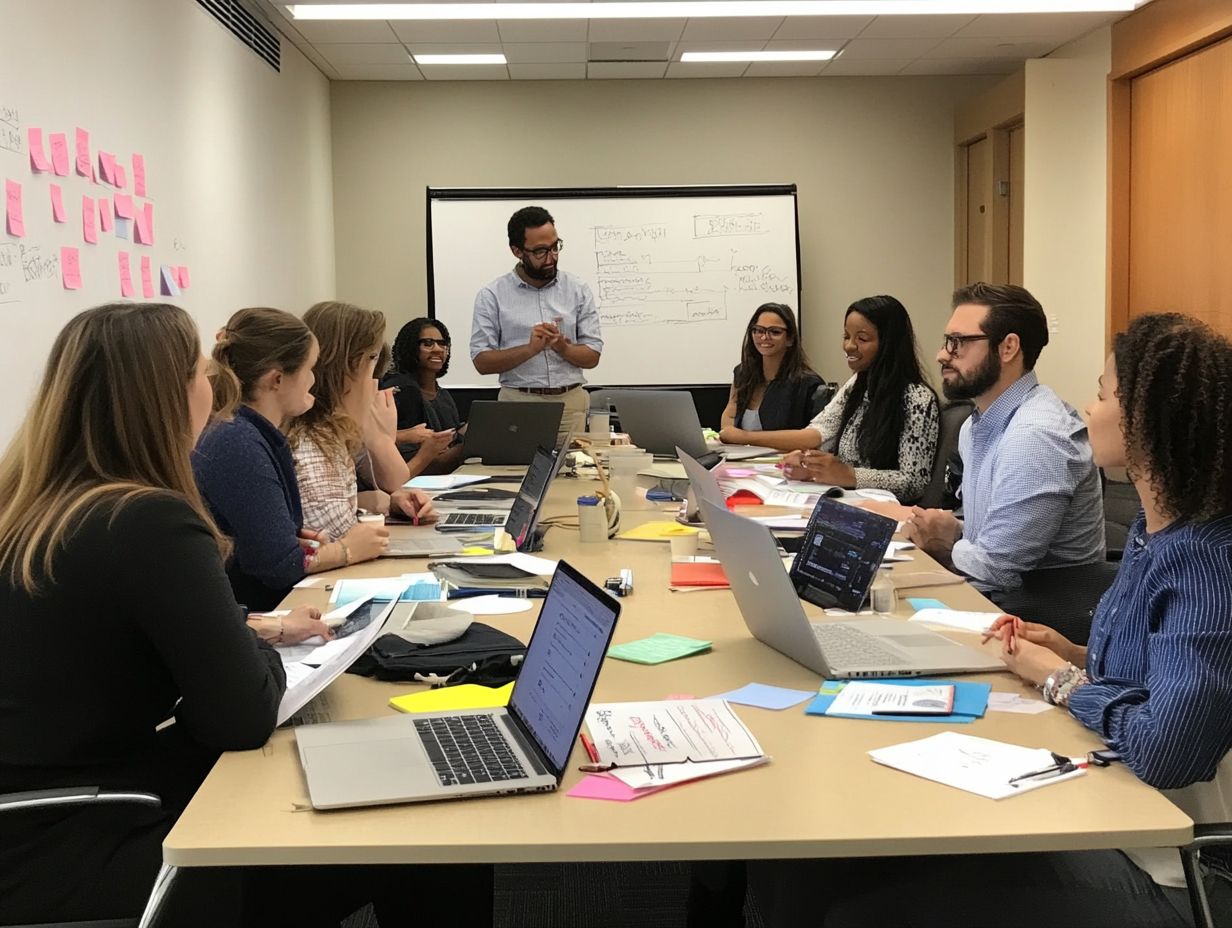5 Steps to Successful Project Management Certification
Navigating the landscape of project management certification may feel overwhelming, but it s an essential step for advancing your career!
This guide distills the certification process into five manageable steps, guiding you from selecting the right certification to maintaining your credentials.
You ll explore the various types of certifications available, understand the eligibility requirements, and uncover effective training programs tailored to your needs.
Discover the advantages of these certifications and gain insights on how to stand out in a competitive job market.
Embark on this pathway to project management success and elevate your professional journey today!
Contents
- Key Takeaways:
- 1. Determine the Right Certification for You
- 2. Understand the Requirements and Eligibility
- 3. Choose a Training Program
- 4. Prepare for the Exam
- 5. Take the Exam and Maintain Certification
- What Are the Benefits of Project Management Certification?
- Frequently Asked Questions
- What Are the Common Mistakes to Avoid in the Certification Process?
- What Are the Career Opportunities with Project Management Certification?
- How Can One Stand Out in the Job Market with Project Management Certification?
- What Are the Ongoing Education and Development Opportunities for Certified Project Managers?
- What is the importance of project management certification?
- What are the 5 steps to successful project management certification?
- How do I choose the right project management certification program?
- What can I expect from a project management certification exam?
- How can I prepare for a project management certification exam?
- What are the benefits of maintaining a project management certification?
Key Takeaways:

Determine the right project management certification for your career goals and skill level.
Understand the eligibility requirements and exam format for your chosen certification.
Choose a reputable training program to prepare for the exam and gain practical knowledge and skills.
1. Determine the Right Certification for You
Choosing the right certification in Project Management is crucial for aspiring project managers. The certification you choose will significantly influence your career trajectory and the success of projects across various industries, including IT, engineering, and healthcare.
Among the most esteemed certifications is the PMP certification offered by the Project Management Institute (PMI). This certification signifies a high level of expertise in leading and directing projects. PMI also offers other certifications, such as the CAPM for beginners and the PMI-ACP for those focusing on agile practices.
When weighing your options, assess your current skills, experiences, and career aspirations. If you have a solid foundation in traditional project management, the PMP might align best with your goals. Conversely, if you want to specialize in agile practices, the PMI-ACP could be a better fit!
By evaluating your personal strengths and your industry’s needs, you can make informed choices that advance your career and enhance your effectiveness in delivering successful project outcomes.
2. Understand the Requirements and Eligibility
Understanding the requirements and eligibility criteria for project management certifications is crucial for prospective project managers. This knowledge gives you the power to prepare thoroughly and ensures you meet all necessary qualifications for successful certification.
Take the Project Management Professional (PMP) certification, for instance. It requires specific educational qualifications, typically a four-year degree, along with a minimum of three years of project management experience.
You are also expected to showcase proficiency in various project management skills, including leadership, communication, and risk management. These prerequisites are tied to the project lifecycle, emphasizing the need for effective planning, execution, and closing of projects.
By improving these skills, you not only fulfill certification standards but also meet the expectations of key project stakeholders, paving the way for successful project delivery!
3. Choose a Training Program
Choosing the right training program for your project management certification is a key step that helps you understand project management better, as highlighted in 5 ways to boost your PM career with certification.
With many options available, like Coursera, which offers a wide array of courses on Agile techniques, and Smartsheet, known for its hands-on approach to project management, you have the chance to select a program that aligns with your learning style and professional aspirations.
As you evaluate these training programs, consider factors such as the breadth of the course content, the qualifications and experience of the instructors, and how well the curriculum aligns with agile principles.
By engaging in these programs, you can refine your skills, enhance team productivity, and ensure improved project outcomes!
Start your journey towards certification now!
4. Prepare for the Exam
Preparing for your project management certification exam demands a structured approach that thoroughly covers project management principles, methodologies, and the practical application of tools. Utilizing 5 tips for passing the project management certification exam can help sharpen your management skills effectively.
A strategic study plan is essential; it should weave together various techniques to enhance your learning experience.
Implementing a communication plan helps maintain clarity on key concepts, while utilizing project tracking tools allows for an organized review of the material.
Engaging in practice exams reinforces your knowledge and highlights any gaps in your understanding, guiding your focused revisions.
Mastering the project phases of planning, execution, and closure is crucial, as these form the foundation for success in real-world scenarios. Additionally, knowing how to maintain your project management certification will ultimately lead to strong performance in your certification exam.
5. Take the Exam and Maintain Certification

Taking the project management certification exam is the crucial final step in validating your skills as a project manager. For those looking for guidance, consider this advice for new project managers seeking certification. Once you achieve that certification, remember that maintaining it requires ongoing professional development and a commitment to industry standards.
The exam process begins with thorough preparation, which means understanding the logistics, such as registration timelines and the test format. Familiarizing yourself with the structure is key; you can expect a series of multiple-choice questions that will assess various aspects of your project management knowledge.
Success in this endeavor hinges on your consistent studying. Joining study groups can provide valuable support.
Continuous education is essential for maintaining your certification; it is also an opportunity to enhance your skill set. Attending workshops or pursuing further certifications will keep you competitive and effective in this ever-evolving field.
What Are the Benefits of Project Management Certification?
Pursuing project management certification opens the door to a wealth of benefits, such as enhanced job growth opportunities, a richer understanding of project methodologies, and the development of essential skills critical for effective project management across diverse industries, including IT and healthcare.
This credential boosts your earning potential by qualifying you for higher-paying roles and elevates your status and recognition among peers, establishing you as a credible leader within your team.
Certification provides the tools necessary to navigate complex projects more efficiently, leading to improved project performance and outcomes.
As you tackle intricate challenges, you will experience significant personal growth, cultivating confidence and expertise that enhance your overall ability to deliver successful results. This ensures you remain competitive in a rapidly evolving job market.
What Are the Different Types of Project Management Certifications?
You will find a variety of project management certifications tailored to different methodologies and professional needs, including the prestigious PMP certification from PMI and Agile certifications that highlight iterative project management techniques.
Among the most sought-after methodologies, Agile and Scrum focus on flexibility and continuous improvement, making them particularly suited for the fast-paced realms of IT and software development. Certifications like Certified ScrumMaster (CSM) or PMI-Agile Certified Practitioner are especially advantageous for those aspiring to become Scrum Masters or Agile Coaches.
If you are navigating more structured environments, such as healthcare or traditional project settings, certifications like PRINCE2 or Lean Six Sigma may be more suitable. These certifications offer a thorough approach to process management.
Each certification uniquely aligns with your career aspirations, paving pathways across diverse sectors from business management to technology-driven environments.
What Are the Requirements for Each Certification?
Every project management certification has specific requirements. To be well-prepared for both the certification process and your future role, it’s important to explore understanding project management certifications.
Typically, these include educational qualifications, relevant experience, and specific skills needed for good project management. Many certifications require a degree in a related field to build a solid foundation.
Hands-on experience empowers you to tackle real-world challenges confidently. Communication, risk management, and problem-solving are crucial skills for steering projects to success.
Meeting these requirements not only boosts your qualifications but also equips you with practical knowledge and confidence that employers seek.
How Can One Choose the Best Training Program for Them?
Choosing the right training program for project management certification involves careful evaluation. Focus on key factors such as curriculum, quality of instruction, cost, and alignment with your career goals.
Consider course reviews from past participants. These insights can reveal the program s effectiveness and help you know what to expect.
Think about the program’s flexibility. A schedule that fits your commitments can make a big difference in your success.
Ensure the training prepares you for the certification exam. This step is crucial in your project management journey, so it’s important to know how to choose the right project management certification.
Reflect on your learning style whether you thrive in interactive settings or prefer self-study. This can help you find a program that truly meets your needs.
What Are the Best Study Methods for Preparing for the Exam?

Effective study methods are essential for preparing for the project management certification exam. They deepen your understanding of concepts and provide guidance on navigating the world of project management certifications, building confidence in applying skills in real-world situations.
Utilizing various study techniques can greatly enhance your preparation.
- Group study sessions create a collaborative environment to share insights and clarify doubts.
- Flashcards allow for quick revisions and help memorize key terms.
- Taking mock exams familiarizes you with the exam format and highlights areas needing attention.
- Explore online resources like webinars and forums for diverse perspectives and up-to-date information.
A well-rounded approach not only enriches your knowledge but also boosts your chances of passing the exam.
How Can One Maintain Their Certification?
Maintaining your project management certification is vital for keeping your skills sharp. It requires a commitment to ongoing education and professional development.
Engage in various forms of continuing education. Earning continuing education units (CEUs) through courses, seminars, or online training is a great way to stay current.
Attending workshops is essential for hands-on experience and insights into the latest tools and methods. Networking at industry conferences and local meetups is also important.
By staying informed about industry developments, you enhance your effectiveness in managing projects and broaden your career prospects.
Frequently Asked Questions
What Are the Common Mistakes to Avoid in the Certification Process?
Avoiding common mistakes in the certification process is essential for aspiring project managers. Understanding the top 5 challenges in project management certification can help prevent missteps that cause unnecessary delays, inflate costs, and ultimately hinder your path to certification.
Many candidates underestimate the importance of thorough study preparation. This can leave them feeling ill-equipped to confront the exam. It s easy to misinterpret the exam requirements and get sidetracked by irrelevant details, which can seriously undermine your chances of success.
Start by creating a structured study plan today for success! Break down essential topics into manageable sections to ensure you cover the syllabus completely.
Regularly reviewing key project management principles using flashcards or engaging in discussion groups can reinforce your understanding and enhance retention.
Incorporating practice tests into your study routine is invaluable. These tests help identify areas for improvement and familiarize you with the exam format, ultimately boosting your confidence when it s time for the big day.
What Are the Career Opportunities with Project Management Certification?
Project management certification opens up a wide array of career opportunities, significantly enhancing your job growth prospects and positioning you for leadership roles across various industries.
This certification equips you with important skills, placing you in an advantageous position for roles like project manager, business analyst, and team leader.
The demand for certified professionals is particularly strong in sectors such as IT, healthcare, and engineering. Effective project execution is crucial for driving innovation and meeting organizational goals.
Employers value formal certification more than ever, viewing it as a testament to your dedication and expertise. As organizations adapt and expand in today s fast-paced environment, they actively seek individuals who can lead teams and projects with confidence and skill.
How Can One Stand Out in the Job Market with Project Management Certification?
Standing out in the competitive job market with your project management certification isn’t just about snagging that credential; it s about showcasing a solid skill set, relevant experience, and a proven history of successful project execution.
Craft a powerful resume that highlights your accomplishments and relevant projects, customizing it for each application. Don t underestimate the value of networking whether through professional associations or social platforms, these connections can significantly boost your visibility and unlock new job opportunities.
In interviews, demonstrating essential soft skills like effective communication and leadership is crucial. Actively market yourself with well-prepared pitches and highlight your past successes to craft a compelling narrative. This resonates with potential employers and increases your chances of landing that coveted role.
What Are the Ongoing Education and Development Opportunities for Certified Project Managers?

For certified project managers, embracing ongoing education and professional development is essential to remain competitive. You need to adeptly navigate the ever-evolving trends and methodologies in the project management landscape.
Engaging in diverse learning modalities such as workshops, seminars, webinars, and online courses can significantly enhance your skill set. These pathways not only provide insights into the latest tools and techniques but also foster networking with industry professionals. Such connections can elevate your career.
By prioritizing continuing education, you ensure that your expertise stays relevant, directly influencing your career trajectory. The knowledge you gain through these platforms often boosts your confidence in decision-making and enhances your ability to tackle complex projects, making you a more attractive candidate to both current and prospective employers.
What is the importance of project management certification?
Project management certification offers clear steps for managing projects effectively.
It also validates your skills, making you more marketable and increasing your earning potential!
What are the 5 steps to successful project management certification?
The steps include:
- Understand the requirements,
- Choose the right program,
- Prepare for the exam,
- Take the exam, and
- Keep your certification active through education.
How do I choose the right project management certification program?
Consider your career goals, industry, and experience level.
Research programs to find the one that fits you best!
What can I expect from a project management certification exam?
The exam usually consists of multiple-choice questions about project management principles and practices.
It might include scenario-based questions, so be prepared to demonstrate your understanding!
How can I prepare for a project management certification exam?
Take a prep course and review study materials.
Joining study groups can also be very helpful!
What are the benefits of maintaining a project management certification?
Keeping your certification shows a commitment to your professional growth.
This can lead to new opportunities and higher-paying roles in your career.






